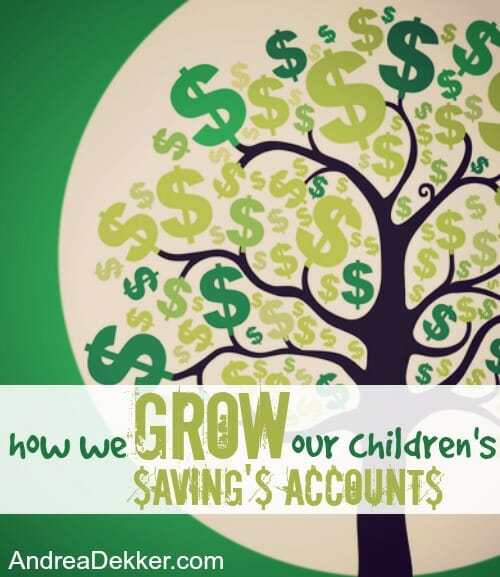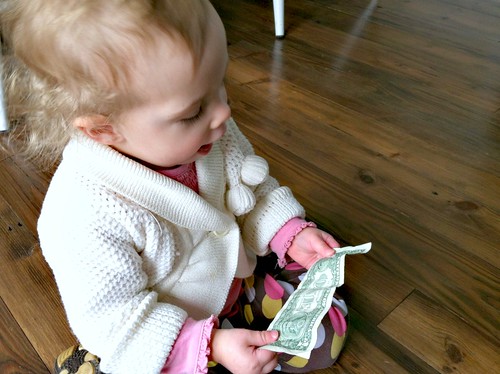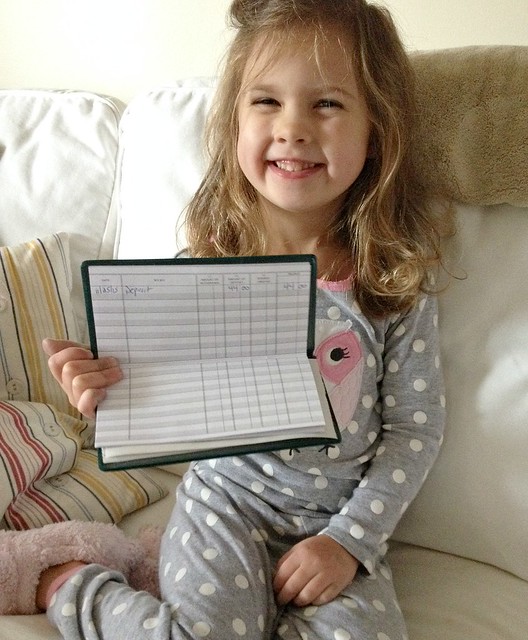At this point in our lives, Dave and I don’t give any type of allowance to our children.
There are many reasons for this decision:
- Our kids are still really young and they don’t really understand money all that much.
- Dave and I never got any type of allowance growing up, so it’s not something we’ve naturally thought to implement with our own children.
- It’s a pain in the butt to remember to keep the right denominations of cash on hand to divvy out each week or each month.
- We don’t want our kids to have so much cash around all the time, but we don’t want to take them to the bank every week either.
- Our kids don’t really DO all that much to “deserve” an allowance. They do basic things like put their clothes away, pick up toys, set the table, etc. but so far, they don’t expect to get paid for that, and I don’t want to start paying!
That said, we DO have automatic transfers set up between our bank account and their bank accounts to move a specified amount of money into their accounts every single month… and boy does it add up after a while!
Here’s what WE do…
Each month, on the date of their birthday, we transfer their age in dollars into their account.
For example:
Nora was born on the November 22, so on the 22nd of every month, $6 (soon to be $7) is withdrawn from our account and deposited into her savings account.
Simon was born on March 4, so on the 4th of every month, $4 is withdrawn from our account and deposited into his savings account.
James was born on July 14, so on the 14th of every month, $3 is withdrawn from our account and deposited into his savings account.
Clara was born on September 25, so on the 25th of every month, $1 is withdrawn from our account and deposited into his savings account.
.
This method is VERY simple (probably why it works so well for our family) and requires virtual ZERO effort from me or Dave once we set up the initial automatic transfer — which we did via our bank’s online banking.
- We don’t have to remember to authorize the transfer for each child.
- We don’t have to make any special trips to the bank.
- We don’t have to carry cash around with us.
- We don’t have to worry about forgetting and then doubling up (or tripling up) the next month.
- We also do not take the time to record these deposits in separate bank ledgers — we figure they don’t really withdraw money from their accounts, so we don’t have to worry about a shortage of funds. I just check in on the accounts a couple times a year to make sure all the deposits show up.
The ONLY thing I have to remember to do is to change the dollar amount each year before their next birthday. I just did this last week in preparation for Nora’s upcoming birthday (which is also the reason I thought to write today’s post!)
(Nora as a toddler — can’t believe she’s almost 7!)
.
A Word Of Encouragement for the Perfectionists!
If you think this sounds like a doable plan for your family, but you feel bad because you “didn’t start right away” or feel like it might be unfair for older children who wouldn’t get as much put into their account… just take a deep breath and realize that SOME money in their accounts is better than NO money.
Just start now with whatever age your children are and don’t worry about what you could have or should have done years ago.
If you are REALLY concerned about it (and have extra funds available) simply figure out how much pre-interest money could be in each child’s account by adding up the numbers below and depositing that lump sum into their accounts right away.
- age 1 = $12
- age 2 = $24
- age 3 = $36
- age 4 = $48
- age 5 = $60
- age 6 = $72
- age 7 = $84
- age 8 = $96
- age 9 = $108
- age 10 = $120
Once you do the initial deposit, then set up an auto deposit each month (either on their birth date, the 1st of the month, or whatever works best with your pay schedule).
There is no “right way” to do this — nor do I even think it’s necessary to do it at all. It’s just something Dave and I decided WE wanted to do for OUR children — and it has turned out to be extremely simple way to grow their savings over time.
.
Looking for more thoughts on kids + money?
Read this post I shared earlier this year about how we handle kids and money. It’s a Reader Question post — so make sure you read all the great ideas in the comments too!





Teri says
We pay our 5 year old and 3 year old commissions for set chores. The chores change on their birthday every year. They have a special bank at home that has 3 sections for giving, saving and spending. My husband goes to the bank once a month to get the commissions for us to give out. If they do the chores, they get paid and if they don’t do a chore, they don’t get paid. (They usually only get to skip a chore once before we help them do it. Just like brushing teeth, it’s something we make them do.) I know they’re young, but we hope the lessons we’re teaching with them stick for a lifetime.
Andrea says
this sounds like a great system — do you have a link to the type of banks you use? I’ve been looking for something like that but can’t find anything I like!
Jamie says
Sounds like Dave Ramsey. Here are banks from his site but there are other similar banks (wallets too!) out there.
https://www.daveramsey.com/store/product/smart-saver-bank?int_cmpgn=christmas_campaign_2018&int_dept=pub_bu&int_lctn=Store-Giftfinder&int_fmt=button&int_dscpn=gift_finder_kids
Andrea says
Thanks for the link Jamie!
Ale says
I really like the idea of their own bank accounts but wonder when/how to give them access to it… A while back an acquaintance had to deal with a rebellious teenager who threatened to withdraw all her money and use it to leave home. This gave me real pause! I don’t expect my kids to behave like that in the future, but I’m sure neither did my acquaintance…
Andrea says
We honestly don’t really have a plan for this. However, my name is on their account and I need to sign off before they can just withdraw money — so in the even of a rebellious teen, I would just refuse to sign off on a withdraw.
Rachel says
I just want to say that my parents saved a little each month for my sister, brother, and me in a savings account for each of us. We also asked them to put larger birthday and Christmas gifts of money from grandparents in them as well. We knew we had them. They stopped putting money in mine when I married at age twenty (although they gave other gifts still). I saved mine until we purchased a house when I was thirty, and I was able to pay cash for a nice real wood bedroom furniture set. That was such a wonderful purchase that still means so much to me! We have enjoyed it for ten years now!
Also when my daughter and son were born, I saved all monetary baby gifts I received for them and used that to start their savings. Then, we put $10 each month in their account. It is automatically withdrawn. This is how we have done it, and it works great for us. They are 10 and 12, know they have the account for someday when they are older, but do not expect to use it at this time. It is similar to what you do, except the amount has been the same all these years. I do like the increase with age though. I think I might implement that now! Great idea!
Andrea says
Thanks for sharing Rachel. I love hearing what other families do or did!
JJ says
This is a GREAT idea!!! We deposit 30% of all cash gifts $50+ into their savings. The grandparents give large amounts for birthdays and Christmas. It has cut down on toy clutter and also has grown their savings. Win-win!
Andrea says
good plan — I like the 30% idea too (and less toy clutter!)
ShellyL says
Love this! I am often wondering how to handle kids and money. I may start to implement this plan soon.
Andrea says
yay — hope it works for your family too!
Ronnie Dean says
Awesome idea….as usual!! Getting mine set up for my girls right now!!
Andrea says
Thanks Ronnie 🙂 I’m sure your girls will appreciate it!
Donna says
Our child is now 17. We have never paid him to do household chores. Everyone in the household is responsible for some part of the household chores…delegated mostly appropriately. We will pay him for tasks that we would have hired someone else to do…like painting the fence…We started an allowance when he was old enough to buy some of his own things on a more routine schedule. Example…we provide a basic school lunch. If he wants to purchase a coffee or get tacos after school, he pays. We buy a basic school wardrobe. If he wants the upgraded sneakers, he pays the difference. Or buys something else. We figure the allowance isn’t a reward, it is a system to teach him how much life costs and the value of eating snacks at home in order to purchase a cool guitar down the road. It’s not perfect, but it seems to work for us.
Andrea says
sounds like a good system — thanks for sharing what works for you!
Summer says
My 5 are almost all out of the house, but we rarely did ‘allowance.’ I tried every method on the planet to inspire, including set amounts to be earned each week, but learned not to pay for them to do the simple things that are part of being a family and living in a household together. Everyone was/is expected to clean up after themselves and to maintain their rooms and clothes, etc, and to contribute to the overall upkeep as needed.
So yes, we did try a traditional allowance over the years, but with the price of items these days… phones, jeans, shoes, gaming equipment, etc. It’s literally too exorbitant for them to earn an ‘allowance’ enough to compensate for these at any ages. They didn’t get “phones” at any set ages. They had to get actual jobs and pay their own cell phone bills, or rather ‘their shared’ portion on our bill. We paid for most of their expenses, being school or sports, clothes and toys, but we kept it extremely reasonable.
Today we have hard working, successful and productive adults who contribute and earn their own livings. Each one of them is completely on their own, even at their young ages. All with manageable school loans, a few with car payments, a few with homes, but each living within the parameters of their incomes. I feel it’s more important to teach them the value of money and being responsible with it, over giving it to them. They made mistakes, but ultimately they owned them and grew from them. They also each learned to budget their own earned income through these trials and errors. The same my husband and I did at their ages.
While this is my two cents on budgeting, I think this is a great idea of Andrea’s, as always, but I doubt this is money to be spent on any of the things I mentioned about. I assume it’s a long term savings and her kiddos will be responsible with it! The concept more on compounding the savings is really the gift here!
Andrea says
Sounds like you did what worked best for your family — and it paid off!
Thanks for sharing Summer!
Ann says
Do your kids know about these accounts? Is the money theirs to use or is it just for them to save for the future. If they decide they really want something expensive (American Girl Doll, Large Lego set, Super nerf gun, etc) can they use this account? At what age will they know about and be able to tap into these savings? Just college or a car or house? Earlier?
We do pay an allowance on this second time around parenting simply to begin to teach the value of money without “stress” on our part. Our 6 year old just spent $9 on something that I thought was worth $2. He is thrilled with it this week but we will see how thrilled he is when he wants something next week and can’t afford it. (He gets $2/week and decides for himself how to split it between save, spend, give -he just has to do all 3.) If he sees something in the store and wants it all I have to do is ask him if he can afford it and if he chooses to spend his money on it. No whining or begging.
I absolutely agree that kids should have jobs which are their household contributions and which are not tied to an allowance. Our boy does not get paid to do things around the house and the things he does helps boost his self-esteem, feelings of confidence and competence, and includes him as a part of the family. Neither is his allowance tied to his behavior. He gets an allowance so he can learn the value of money and how to live within his means. He needs to learn this lesson whether or not he is behaving appropriately so he gets it every week regardless of what the week has been like.
Periodically, he makes a trip to the bank to deposit the money he has saved. The bank often rewards him with a prize when he hits certain milestones and he loves that! (It also removes the temptation for him to want to “rob” his save money for an item he wants and suddenly remembers he has been saving for.) 😉
Andrea says
They know they have savings accounts and that there is money in them. However, at this point, they don’t really do anything with the money. Nora and Simon both have some money in their wallets at home. Nora uses this if she wants to buy cookies at school on Friday or for the church offering on Sunday. but so far, we haven’t withdrawn money from their accounts yet. This might happen in the future though as I don’t anticipate all this money will just stay in their accounts forever!
Pamela says
Genius!